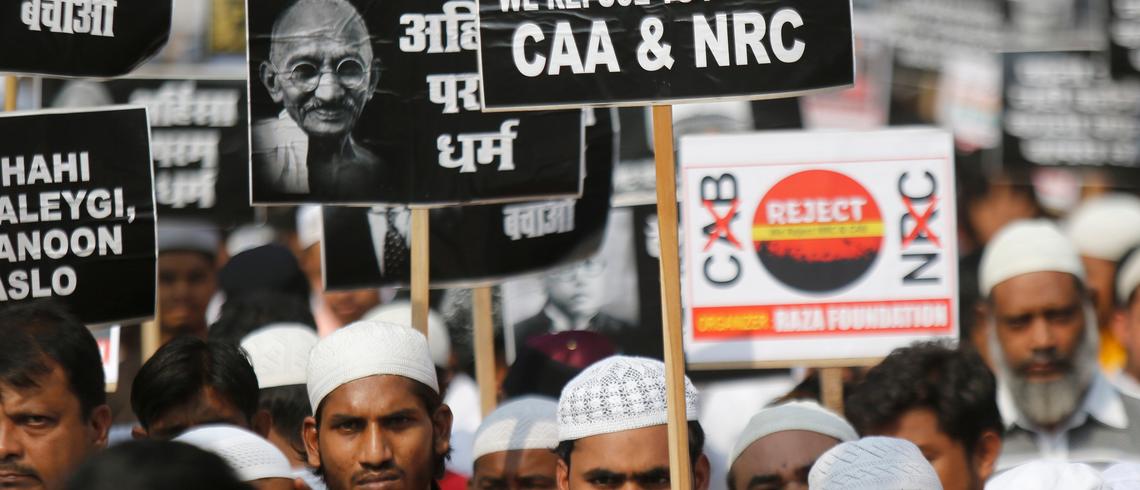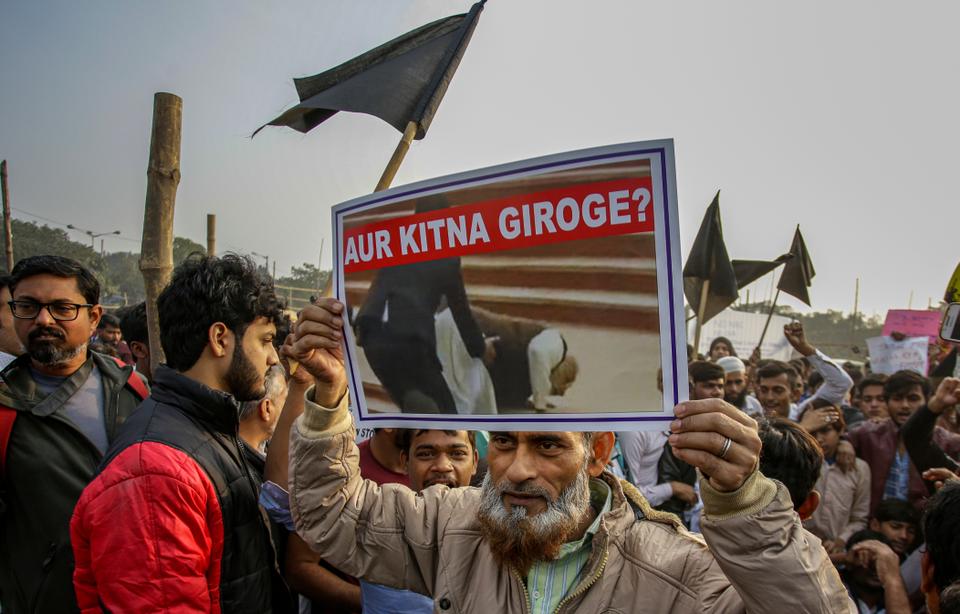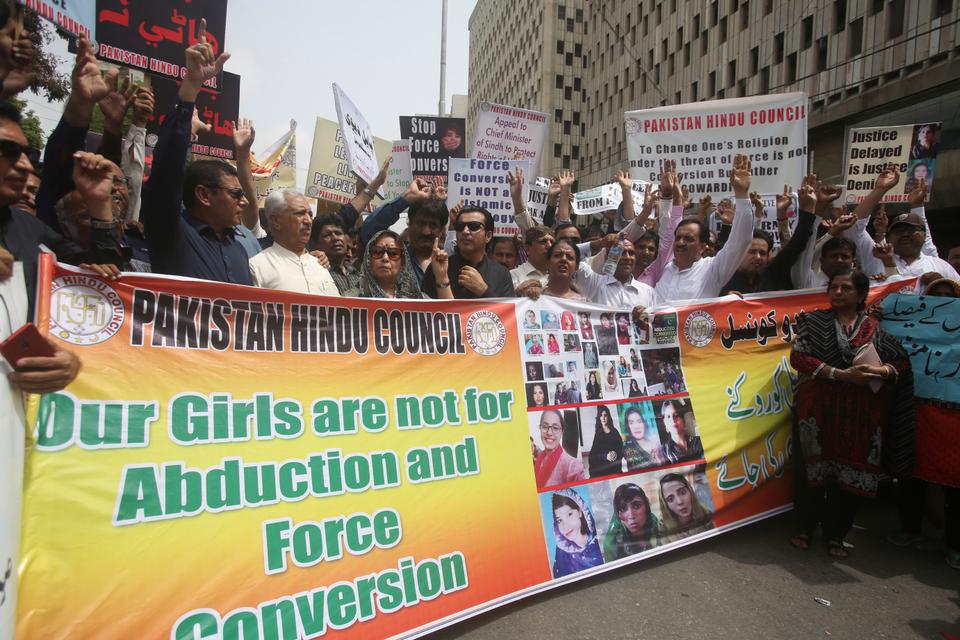
https://www.trtworld.com/
Afghanistan, Bangladesh, Bhutan, India, Nepal, Pakistan, Sri Lanka are all in the same rickety boat when it comes to human rights.
The past ten years have been abysmal for minorities and civil rights activists in South Asian countries including India, Pakistan and Sri Lanka, according to the South Asia State of Minorities Report 2020.
Governments have introduced repressive laws that curb freedom of expression, persecute journalists and bar people from organising peaceful demonstrations, says the report published by the South Asia Collective, an international group of activists and NGOs.
Some laws disproportionately target minorities such as Muslims in India and Sri Lanka, and Christians in Pakistan.
One policy that transcends almost all the regional governments is their attempt to restrict the role of NGOs - especially if they receive funding from abroad.
India’s suffocating measures
India, where minorities have faced state-sanctioned violence since the Hindu nationalist Bharatiya Janata Party (BJP) was re-elected last year, has handicapped foreign NGOs by setting limits on how they can spend money received from international donors.
Most of the affected NGOs are the ones that work in areas which highlight abuse of power, government indifference towards the plight of minorities, and the brutality of security forces.
“BJP rule has been characterised by the open targeting of several high-profile NGOs, with foreign funding freezes being the weapon of choice,” the report said.
The past ten years have been abysmal for minorities and civil rights activists in South Asian countries including India, Pakistan and Sri Lanka, according to the South Asia State of Minorities Report 2020.
Governments have introduced repressive laws that curb freedom of expression, persecute journalists and bar people from organising peaceful demonstrations, says the report published by the South Asia Collective, an international group of activists and NGOs.
Some laws disproportionately target minorities such as Muslims in India and Sri Lanka, and Christians in Pakistan.
One policy that transcends almost all the regional governments is their attempt to restrict the role of NGOs - especially if they receive funding from abroad.
India’s suffocating measures
India, where minorities have faced state-sanctioned violence since the Hindu nationalist Bharatiya Janata Party (BJP) was re-elected last year, has handicapped foreign NGOs by setting limits on how they can spend money received from international donors.
Most of the affected NGOs are the ones that work in areas which highlight abuse of power, government indifference towards the plight of minorities, and the brutality of security forces.
“BJP rule has been characterised by the open targeting of several high-profile NGOs, with foreign funding freezes being the weapon of choice,” the report said.

New Delhi's discriminatory amendment to citizenship law has further alienated India's Muslims. (AP Archive)
Other policy changes such as requiring NGOs to register with income tax authorities every five years are a similar tool of “administrative harassment”.
“Along with attempts to prevent groups working on critical issues, human rights defenders have also reported being subject to threats and intimidation by state agencies and ideological groups aligned to them.”
The intimidation is not limited to NGOs as journalists reporting on creeping BJP authoritarianism often feel the wrath of the state.
“...between 25 March and 31 May 2020, at least 55 Indian journalists faced arrest, physical assaults, destruction of property, threats or registration of FIRs (police reports),” the report said.
New Delhi increasingly relies on internet controls to curb dissent. Internet shutdowns jumped to 106 in 2019 from only six in 2014 as authorities used different laws to control the flow of information.
Kashmir faced a complete internet blackout for months after the Muslim-majority region’s nominal autonomy was withdrawn last year.
“The Indian government has reportedly submitted the most number of content takedown requests to social media platforms, and at least 50 people—mostly Muslims—were arrested for social media posts in just 2017 and 2018 alone,” the report noted.
India is also using the draconian Unlawful Activities Prevention Act to target Dalits, a caste of Hindus who face widespread discrimination under the country’s hierarchical caste system.
“Laws ostensibly meant for the protection of cows continue to provide institutional backing for similar campaigns against Muslims and Dalits,” the report said.
Changes in the Citizenship Act that target Muslim migrants and the brutal police reponse to subsequent protests — in which 22 people were shot dead in Utter Pradesh state in a single day — further illustrate the worsening status of minorities in India.
Thy neighbours are no good
In neighbouring Pakistan, India’s archrival, minorities and those activists trying to help them, fare no better.
“NGOs and INGOs (international NGOs) are subject to extensive regulation involving multiple, lengthy procedures of registration, security clearance, and approvals for funding,” the report said
Other policy changes such as requiring NGOs to register with income tax authorities every five years are a similar tool of “administrative harassment”.
“Along with attempts to prevent groups working on critical issues, human rights defenders have also reported being subject to threats and intimidation by state agencies and ideological groups aligned to them.”
The intimidation is not limited to NGOs as journalists reporting on creeping BJP authoritarianism often feel the wrath of the state.
“...between 25 March and 31 May 2020, at least 55 Indian journalists faced arrest, physical assaults, destruction of property, threats or registration of FIRs (police reports),” the report said.
New Delhi increasingly relies on internet controls to curb dissent. Internet shutdowns jumped to 106 in 2019 from only six in 2014 as authorities used different laws to control the flow of information.
Kashmir faced a complete internet blackout for months after the Muslim-majority region’s nominal autonomy was withdrawn last year.
“The Indian government has reportedly submitted the most number of content takedown requests to social media platforms, and at least 50 people—mostly Muslims—were arrested for social media posts in just 2017 and 2018 alone,” the report noted.
India is also using the draconian Unlawful Activities Prevention Act to target Dalits, a caste of Hindus who face widespread discrimination under the country’s hierarchical caste system.
“Laws ostensibly meant for the protection of cows continue to provide institutional backing for similar campaigns against Muslims and Dalits,” the report said.
Changes in the Citizenship Act that target Muslim migrants and the brutal police reponse to subsequent protests — in which 22 people were shot dead in Utter Pradesh state in a single day — further illustrate the worsening status of minorities in India.
Thy neighbours are no good
In neighbouring Pakistan, India’s archrival, minorities and those activists trying to help them, fare no better.
“NGOs and INGOs (international NGOs) are subject to extensive regulation involving multiple, lengthy procedures of registration, security clearance, and approvals for funding,” the report said
.

The Christians and Hindus in Pakistan regularly complain that young girls are forced to convert to Islam. (AP Archive)
In recent years, Islamabad has increased vigilance on NGOs which it fears might be working on a foreign agenda to promote dissent.
What will particularly bother Pakistan’s policymakers is the report's focus on how the country’s Blasphemy Law, meant to protect religious sentiments, continues to be misused against minorities.
“In reality, the law explicitly discriminates against Ahmadiyas since parts of it criminalise public expression of Ahmadiya beliefs and prohibit Ahmadiyas from calling themselves Muslims, praying in Muslim sites of worship and propagating their faith.”
Just this week, a report by the United States Commission on International Rights Freedom pointed out that Pakistan accounts for nearly half of the incidents of mob violence against alleged blasphemers.
At times, people accused of blasphemy are killed in court in front of police and lawyers.
Christians, another minority, are frequently targeted while authorities do little to protect them.
For instance, a church constructed in the Toba Tek Singh district of Punjab province had to be sealed in 2016 after local Muslims agitated against it.
This alienation doesn’t stop at the places of worship - young Chrsitan students are continuously harassed by their peers to convert to Islam, the report said.
Similarly, Sri Lanka witnessed rising levels of intolerance towards minorities in recent years, especially as successive governments tried to pacify extremist Buddhists to garner their votes.
Muslims in Sri Lanka have felt a wave of discrimination and official apathy after the suicide attacks that killed more than 200 people last year.
“After the Easter attacks, Muslims, particularly a large number of Muslim men, were arrested seemingly without reasonable cause.”
Jingoistic government-aligned media has helped paint Muslims as the villain in Sri Lanka.
“The incitement of hatred and vitriol by media outlets continues unabated. For example, Muslim Covid-19 patients were identified by their faith, unlike other patients, and blamed by the media
In recent years, Islamabad has increased vigilance on NGOs which it fears might be working on a foreign agenda to promote dissent.
What will particularly bother Pakistan’s policymakers is the report's focus on how the country’s Blasphemy Law, meant to protect religious sentiments, continues to be misused against minorities.
“In reality, the law explicitly discriminates against Ahmadiyas since parts of it criminalise public expression of Ahmadiya beliefs and prohibit Ahmadiyas from calling themselves Muslims, praying in Muslim sites of worship and propagating their faith.”
Just this week, a report by the United States Commission on International Rights Freedom pointed out that Pakistan accounts for nearly half of the incidents of mob violence against alleged blasphemers.
At times, people accused of blasphemy are killed in court in front of police and lawyers.
Christians, another minority, are frequently targeted while authorities do little to protect them.
For instance, a church constructed in the Toba Tek Singh district of Punjab province had to be sealed in 2016 after local Muslims agitated against it.
This alienation doesn’t stop at the places of worship - young Chrsitan students are continuously harassed by their peers to convert to Islam, the report said.
Similarly, Sri Lanka witnessed rising levels of intolerance towards minorities in recent years, especially as successive governments tried to pacify extremist Buddhists to garner their votes.
Muslims in Sri Lanka have felt a wave of discrimination and official apathy after the suicide attacks that killed more than 200 people last year.
“After the Easter attacks, Muslims, particularly a large number of Muslim men, were arrested seemingly without reasonable cause.”
Jingoistic government-aligned media has helped paint Muslims as the villain in Sri Lanka.
“The incitement of hatred and vitriol by media outlets continues unabated. For example, Muslim Covid-19 patients were identified by their faith, unlike other patients, and blamed by the media
Sri Lanka makes strong gains in the Human Development Index
Modi's BJP moves to block Muslim refugees from getting Indian nationality
How a Hindu pilgrimage became militarised in disputed Kashmir
India's ruling party's road to votes is paved with dangerous communalism
Jammu and Kashmir: The view from India
Modi's BJP moves to block Muslim refugees from getting Indian nationality
How a Hindu pilgrimage became militarised in disputed Kashmir
India's ruling party's road to votes is paved with dangerous communalism
Jammu and Kashmir: The view from India

No comments:
Post a Comment